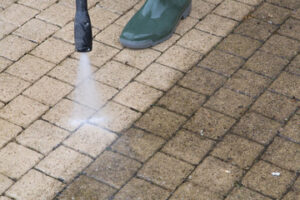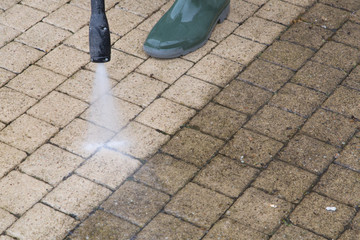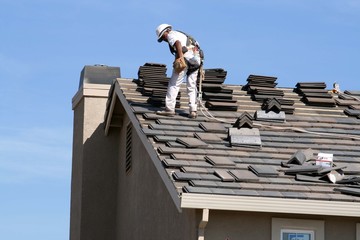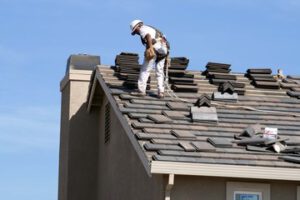Austin Pressure Washing is a great way to clean surfaces and remove build-up from dirt, mildew, algae, and other debris. It is important to use the correct nozzle and pressure setting for each surface in order to prevent damage.
Fill the chemical tank with the appropriate detergent and set the downstream injector to the dilution rate recommended by the manufacturer.
Pressure washing, also known as power cleaning or hot water blasting, is a highly effective method for removing build-up of dirt, mildew, mud, loose paint, salt, grime, oil, rust, and more from surfaces around your home, business, storefront, parking lot, apartment complex, or public spaces. This method of cleaning eliminates these stains and makes surfaces look newer and cleaner, giving them a boost in curb appeal.
When performed by a professional, the process of cleaning using a pressure washer is quick, effective, and economical. A thorough inspection of the property is done to determine the best way to clean each surface, including identifying delicate materials that require lower pressure or specialized treatments. Detergents and water flow rates are carefully manipulated to achieve the desired results while minimizing damage or over-washing.
While it may be tempting to use a pressure washer for yourself, this type of cleaning requires skill and proper equipment. A nozzle that provides a wide spray pattern is recommended to avoid focusing too much pressure on one spot that could cause damage. A turbo nozzle is also useful to reduce the force of the spray, making it easier to maneuver. It is important to choose the right psi and water rotation for each surface, and to be careful when using this tool on wood or brick surfaces. It is also a good idea to cover up and protect plants, electrical outlets, and other sensitive items from the spray and detergent.
Whether you have mold, mildew, moss, algae, or just plain dirt built up on your home, business, or community property, hiring a professional to clean them with a pressure washer is an excellent investment in the beauty and value of your property. It is much cheaper to hire a professional than it is to repair and replace the damaged items, and a good pressure wash can help prevent these problems from reoccurring in the future.
Using a high-quality, commercial-grade pressure washer equipped with a variety of nozzles, your local service provider will clean driveways, walkways, patios, roofs, siding, and more, leaving them looking brand-new again. The biodegradable cleansers they use will also kill and remove fungus, mildew, algae, and moss, preventing their return, while the powerful water jets will remove dirt and debris that has been caked in for years.
Removes Mold and Algae
Algae, moss, mildew and mold are unsightly, but they can also be harmful to your home. They detract from the beauty of your home, but more importantly they can create slippery surfaces that are dangerous to walk on and lead to falls and injuries. Regular pressure washing removes these substances from your home, prevents their growth and returns your outdoor spaces to a safer environment for your family.
While you may be able to remove some of these substances with a brush and soapy water, others will require a more vigorous cleaning. A professional power wash can clean these harder-to-remove materials more thoroughly and in a shorter period of time than you could with a brush or hose. This allows you to get back to enjoying your outdoor spaces sooner.
In addition to removing dirt, mud and other debris from your exterior, pressure washing can also remove many types of stains. For example, if you have concrete that is stained or has oil-based stains from car fluids, power washing can safely remove these stains without damaging the surface underneath.
Pressure washing can also be used to clean mold, mildew and algae from your siding, decks, roofs and other exterior surfaces. Mold and mildew can be very difficult to remove from surfaces with a scrub brush or soapy water, but with the right cleaners and high-pressure power washing, these substances can be removed quickly and effectively.
A power wash can also help to remove any oxidation that has developed on your vinyl siding. This can give your home a dull or gray appearance and may even cause the paint to crack, peel or chip. However, if you have a professional do the pressure washing, they can use the proper settings to ensure that this type of damage is minimal.
If you have a home with weep holes in the side of it, be sure to have a professional power wash your house before painting. Using a power wash to clean your home will likely send water running through these small holes, which can cause them to leak or to develop mold or other issues.
Prevents Damage
Pressure washing is a safe and effective way to clean surfaces around your property. It eliminates harmful buildup, such as dirt, mildew, algae, and mold, which cause deterioration that threatens the longevity of your siding, driveway, roof, patio, and other outdoor spaces. This damage can be costly to repair, causing you to lose money on your investment. Regularly cleaning your exteriors with a professional pressure washer, however, can protect your property from costly repairs and extending its lifespan.
The power of a professional pressure washer is significantly higher than what you could achieve with a standard garden hose, reaching up to 3300 psi. This can make it dangerous to use without the proper training and experience.
If the incorrect water settings or nozzles are used, this can lead to surface damage and even structural vulnerabilities. For example, applying too much pressure directly onto a concrete surface can wear it down or chip the top layer. This exposes the underlying materials to erosion and increases your risk of cracking and premature aging. The correct nozzle size and water pressure is essential for preventing concrete damage, so you should always start at a low setting and work your way up.
A professional can help you choose the right nozzle, water pressure, and cleaning products for each surface type. They will also ensure the proper dilution ratio of chemicals for safe and effective cleaning. This will save you money on chemical solutions and reduce the amount of energy required to power the pump.
Regular pressure washing prevents a variety of problems, such as unsightly stains and the development of hazardous fungi. It also helps you save on maintenance costs.
As a result, it is one of the most cost-effective ways to preserve your property. It is recommended to have your home or commercial property professionally cleaned twice a year to remove all types of debris. It will also provide you with a more polished appearance for events, showings, and home improvement projects. Contact SP Construction LLC for dependable pressure washing services tailored to your property’s needs.
Increases Curb Appeal
A clean, refreshed exterior elevates the look of any home or business. Pressure washing removes stains, dirt, mildew, mold and algae. It also eliminates the build-up of these substances, preventing them from degrading building materials over time. This prevents costly repairs and keeps surfaces looking newer longer. Whether you are preparing to sell your property or simply want to improve its appearance, regular professional cleaning by 904 Power Washing is an effective and affordable way to enhance curb appeal.
Often, the appearance of a building or home suffers over time from weather conditions, seasonal factors and everyday wear and tear. This is especially true in Georgia, where dirt, pollen and debris cling to everything in sight. A dirty exterior gives the impression that a home is poorly maintained, which can affect its value and marketability. Regular cleaning with professional pressure washing can keep your home or business in excellent condition.
In addition to enhancing the appearance of your home or business, a well-maintained exterior conveys pride of ownership and a sense of care and responsibility for your property. This makes it more attractive to neighbors, visitors and potential buyers. Pressure washing reveals the original beauty of building materials, such as concrete, wood and brick. It can make a drab, gray driveway look nearly new again and revitalize a faded deck. It can even restore lead paint, if necessary, if your house was built before late 1970s.
Many homeowners find that boosting their curb appeal is important for attracting prospective buyers in the real estate market. A well-kept home with a fresh, inviting exterior is more likely to sell quickly and for a higher price. A professional pressure washing can spruce up your home or business exterior, making it more appealing and allowing potential buyers to envision themselves living or entertaining there.
A fresh coat of paint, updated landscaping, and the simple touch up of fixtures like window shutters can also help increase a home’s marketability and sale price. But none of these improvements are possible without a thorough cleaning by professionals with the right tools. That’s why so many real estate agents recommend hiring a reputable pressure washing service to keep your home looking its best.



